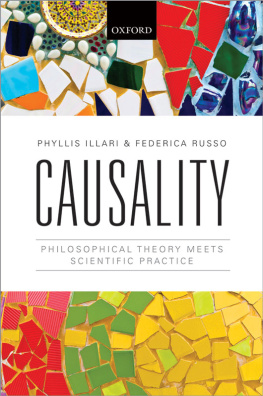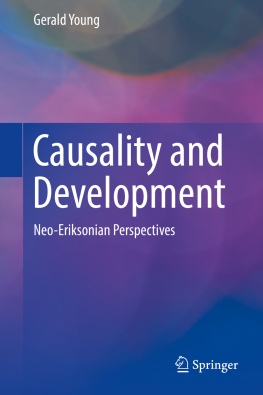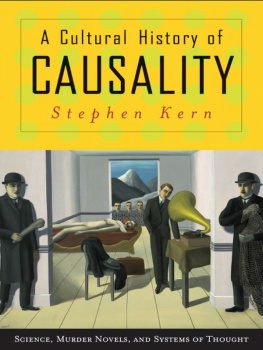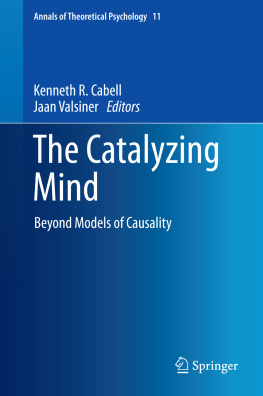Table of Contents
Guide

Wenceslao J. Gonzalez (Ed.)
Philosophy of Psychology: Causality and Psychological Subject
Epistemic Studies

Philosophy of Science, Cognition and Mind
Edited by
Michael Esfeld, Stephan Hartmann, Albert Newen
Volume 38
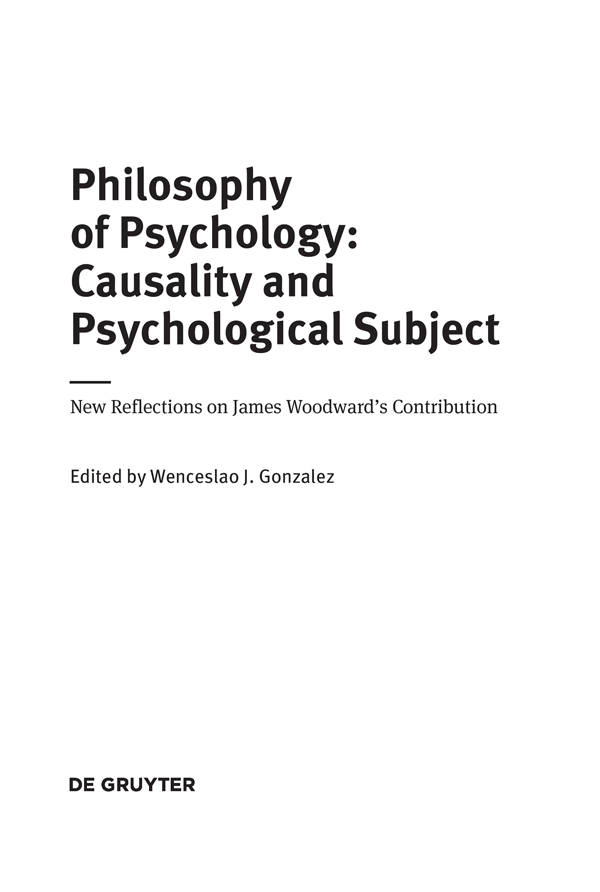
ISBN 978-3-11-057393-0
e-ISBN (PDF) 978-3-11-057605-4
e-ISBN (EPUB) 978-3-11-057398-5
ISSN 2512-5168
Library of Congress Control Number: 2018942830
Bibliographic information published by the Deutsche Nationalbibliothek
The Deutsche Nationalbibliothek lists this publication in the Deutsche Nationalbibliografie; detailed bibliographic data are available on the Internet at http://dnb.dnb.de.
2018 Walter de Gruyter GmbH, Berlin/Boston
www.degruyter.com
List of Abbreviations
| ACC | anterior cingulate cortex |
| AD | Alzheimers disease |
| ADHD | attention deficit hyperactivity disorder |
| AI | Artificial Intelligence |
| ALDH | aldehyde dehydrogenase |
| CAT | computerized axial tomography |
| CRTM | computational and representational theory of mind |
| CTM | computational theory of mind |
| DLPFC | dorsolateral prefrontal cortex |
| DN | deductive-nomological (model) |
| EEG | electroencephalography |
| fMRI | functional magnetic resonance imaging |
| FSIT | functional states identity theory |
| IGT | Iowa gambling task |
| IS | inductive-statistical (model) |
| OCD | obsessive compulsive disorder |
| OFC | orbitofrontal cortex |
| PET | positron emission tomography |
| RCT | randomized controlled trials |
| RTM | representational theory of mind |
| TMS | transcranial magnetic stimulation |
| TNGS | theory of neuronal group selection |
| VMPFC | ventromedial prefrontal cortex |
Wenceslao J. Gonzalez
New Contributions to Psychology as a Special Science: Causality and Psychological Subject
1A Philosophico-methodological Approach to Psychology Focused on Two Central Issues
Contemporary philosophy of science analyzes psychology as a science with special features, because this discipline includes some specific philosophical problems descriptive and normative, structural and dynamic of importance. Some of these are particularly relevant both theoretically (causal explanation) and practically (the configuration of the psychological subject and its relations with psychiatry). Thus, the philosophical analysis developed in this volume seeks to shed new light on philosophy of psychology taking into account descriptive traits and revisionary aspects, which include structural and dynamic features.
Two central aspects in this book are the role of causality, especially conceived as intervention or manipulation, and the characterization of the psychological subject. This requires a clarification of scientific explanations in terms of causality in psychology, because the characterizations of causality are quite different in epistemological and ontological terms. One of the most influential views is James Woodwards approach to causality as intervention, which entails an analysis of its characteristics, new elements and limits. This means taking into account the structural and dynamic aspects included in causal cognition and psychological explanations.
Psychology seen as special science also requires us to consider the scientific status of psychology and the psychological subject, ysis of the limits of computational psychology. In addition, the characterization of the psychological subject has repercussions when dealing with mental disorder, which is also considered in this volume.
Because the approach here is philosophico-methodological, the main themes and objectives are of interest to psychologists and philosophers. Therefore, the book takes into account both scientific areas in terms of interrelation. In this regard, the vision is twofold: (i) psychologists can deal with how subjects learn and reason about causal relationships, and (ii) philosophers can contribute to how people ought to develop reasoning and evaluation about causal relationships (Woodward 2012, p. 961).
Hence, the book considers the descriptive side of the characteristics of psychology as a special science (mainly, the epistemological, methodological, and ontological components) as well as the normative role of philosophy, which is applied in how the psychological explanations especially causal explanations and the psychological subject should be characterized. In addition, the volume has an innovative approach, in that it takes into account the viewpoint of causality as intervention and the characterization of the psychological subject from various angles (cognitive, emotional, and computational).
When the philosophical analysis in this book seeks to shed new lights on those key topics, considering descriptive traits and revisionary aspects, Woodwards conception receives more attention than other approaches. But the present volume offers a broader focus than the influential views of the former president of the American Philosophy of Science Association. Consequently, there are also other viewpoints, both on causality and on the role of the subject in psychology as special science. In addition, some of the analyses of Woodwards points are rather critical.
This broader focus of the book can be seen in the structure of the volume, which starts with the consideration of his views and continues with other perspectives. It is structured in four parts: I) Causal Reasoning in the Context of Normative and Descriptive Psychology; II) Causal Cognition and Psychological Explanations: Structural and Dynamic Aspects; III) Scientific Status of Psychology and the Psychological Subject; and IV) From Psychology to Psychiatry: Limits of Computational Psychology and the Role of Causes as Interventions in Psychiatry. It comprises nine chapters, conceived from different angles. They include two original contributions by Woodward, where he gives new important details concerning his characterization of some of these topics.
2Causal Reasoning in the Context of Normative and Descriptive Psychology
Regarding causation, Woodward is a central figure in the contemporary analysis, due to his original interventionist approach to causation and causal relationships. In addition, he has his own line of research on philosophy of psychology as special science, which is in his perspective dual. On the one hand, it includes a descriptive constituent on what there is, based on empirical grounds (observations and experiments); and, on the other, it highlights the normative component of theoretical reflections , which is a component focused on getting what ought to be thought.
Through two chapters, : Configuration of Causality and Philosophy of Psychology: An Analysis of Causality as Intervention and its Repercussion for Psychology, by Wenceslao J. Gonzalez. He also points out that in Woodwards approach they are accompanied by a modest realism, as ontological support.






